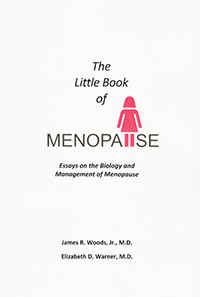I’m Getting Older…Am I Still Relevant?
The Little Book of Menopause; Essays on the Biology and Management of Menopause
The Little Book of Menopause; Essays on the Biology and Management of Menopause will address the role of inflammation as the underlying cause of most of the menopause symptoms, the biologic impact that loss of estrogen plays in this process and the role that hormone replacement serves to reduce these symptoms.
Menopause, Metabolism, and Visceral Fat Accumulation
Our bodies, anthropologically, function solely to reproduce in order to preserve our species. But reproduction requires adequate metabolic energy. Witness the increase in body fat as one enters puberty or the negative effect on fertility for patients with anorexia nervosa, for those engaging in strenuous exercise, or those subjected to famine and starvation. Yet, as our ability to reproduce ceases at the other end of the age spectrum, we experience a reduction in metabolism, redistribution of fat to our abdominal area and, thus, the cardiovascular and diabetic risks of metabolic syndrome. The key to these interactions resides in our hypothalamus where reproduction and metabolism are controlled.



